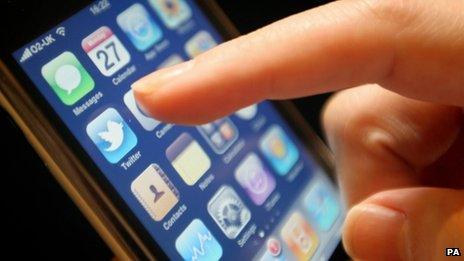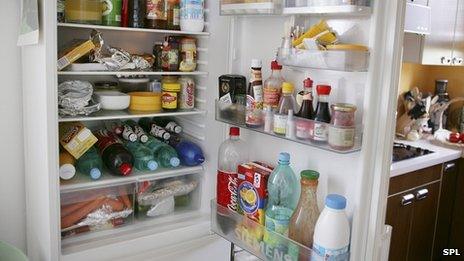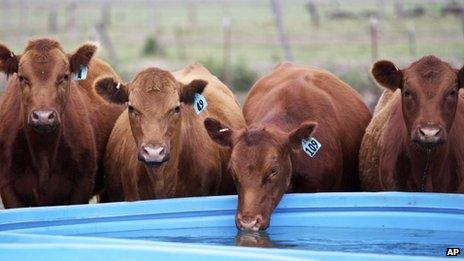The wireless connections that may transform our lives
- Published

We are waiting for an app to dominate how we control interconnected devices
Welcome to the "Internet of Things", a whole new step in connectivity that might dwarf the one we have got used to over two decades of the internet and mobile phone connectivity.
It has taken less than 20 years for there to be six billion mobile phones on the planet, that is one for 85% of the global population. An extraordinary transformation of human reach.
Now - say the experts - comes another transformation of society, the economy and everything else. They are envisaging a world of 50 billion wirelessly interconnected objects - anything from cars to coffee machines.
I'm writing this at the Fifth Future of Wireless International Conference in Cambridge, alias Silicon Fen. Cambridge has become a hotbed for wireless innovation, in which the city has a long history.
WG Pye set up his scientific instruments business in Cambridge in 1896, and it went into radio set manufacture in the 1920s. And it grew - after World War II, Pye Telecommunications was said to be second only to Motorola of the US in radio communications equipment.
But that was long before the concept of Silicon Fen emerged from the concentration of clever people who clustered inside Cambridge University's laboratories.
In 1990, the silicon chip design business ARM was spun out of Acorn, the Cambridge company that had made the pioneering BBC micro-computer. That was in the days when computer-makers often did their own chip designs rather than buy them in from the great big manufacturers.
ARM specialised in chips that used much less power than their rivals. It still does, very successfully. These chips have become increasingly important with the rise of mobile phones and mobile computing, ushering in a wireless world of a scale and scope undreamed of by the pioneers at Pye.
And wireless became a Cambridge speciality. Cambridge Silicon Radio (now CSR) was a company founded in 1999 to create chips for Bluetooth short range wireless communication.
Many of the newer wireless businesses are not well-known. They may have a global reach, but they are consultants or firms without consumer brand names. But that does not mean they are not making money or employing well paid specialists.
Talking domestic appliances
This emergence of a wireless cluster around Cambridge is a significant addition to the British business landscape, and from it has emerged this Future of Wireless conference.
This year the subject has been the Internet of Things, or the "Internet of Everything, or Everywhere".

Intelligent fridges have long been talked about
Just imagine, say the visionaries, what will happen when we start to add sensors and data streaming devices to objects, and things start interconnecting just as people do now.
You'll be able to monitor the security of your house from across the world, via the internet, and turn on the central heating when you're coming home.
Doctors will be able to get live feeds of vital signs from their patients - blood pressure, sugar level, heartbeat. Sensors in stomachs will tell farmers when their cattle need medicine or extra feed.
And fridges will notify owners when they are running low on ingredients for the evening meal.
A lot of this is fairly familiar. I've been hearing about the intelligent fridge for almost 20 years.
Lots of appliances are now so computerised that they ought to be able to benefit from internet connectivity, so that (for example) a connected washing machine could find out how to wash a fabric not invented when the machine was made.
The experts at this conference have been driven by that vision of 50 billion connected things. And at first sight it is both dramatic and exciting for the wireless specialists.
A whole world of possibilities we can barely think about enabled by connectivity that will require some big advances in technology - bandwidth provision, low power transmission, really low-cost devices much cheaper than mobile phones.
'Killer application'
But the Internet of Everything is so large a concept that the vision rapidly becomes first daunting and then a bit paralysing, even to the experts. Who will organise the protocols that enable machines to speak to machines? What regulation will be needed? What about security - who might be hacking in to my central heating system?
Who will do the connecting? Existing mobile networks or new ones? Who will pay what for this extension of the convenience world?

The technology could mean farmers get sent data about their animals' heath
Where is the killer application that will suddenly have consumers clamouring for interconnected devices in the way that the internet itself took off in the 1990s after Sir Tim Berners-Lee at Cern invented the www address system, the worldwide web?
Will the current internet giants evolve into Internet of Things corporations, or will the winners be new, nimble and unheard of?
So many uncertainties and potential difficulties surround the idea of the Internet of Things that it is easy to scoff at the hugeness of the concept.
And yet, of course, it is already happening, bit by bit, sector by sector - at different speeds according to what area of industry or human activity is involved.
Cars are already hugely computerised; the European Union is mandating that all new cars in Europe will have to be fitted with what is called the eCall system, which will automatically connect a vehicle to emergency services following a collision and provide location and impact information. (It has to be said that this was first planned in 2005 with a 2009 deadline for implementation, so there is a lot of room for drift.)
Telemedicine using sensors is being tested in various parts of the world, and may be invaluable in an ageing world. Cameras are already wirelessing their pictures to the internet.
The stands at the Cambridge conference include start-up companies involved with those farm sensors for animals to swallow and send their health data direct to farmers' computers by wireless.
Another business is seeking to seed farmland with hundreds of cheap devices which will radio aridity information direct to a control room so that farmers can direct irrigation directly to the parts of fields where it is needed.
There is plenty of room for bold new disruptive entrepreneurs.
My conclusion to two days' exposure to the exhilarating possibilities of the Internet of Things is that it's too huge to grasp and too easy to get carried away into a sci-fi rhapsody.
But think about it sector by sector, industry by industry, place by place, and something begins to emerge out of the mist. It is happening all round us. But it will probably not be called the Internet of Things.